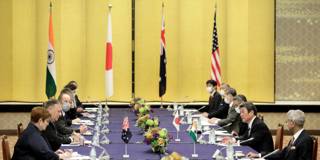Despite US President Donald Trump’s undermining of US alliances, his administration has made significant progress in bringing together the Indo-Pacific's leading democracies. And now that China has forced India's hand, a new strategic arrangement in the region is almost a foregone conclusion.
NEW DELHI – The Quad, a loose strategic coalition of the Indo-Pacific region’s four leading democracies, is rapidly solidifying this year in response to China’s aggressive foreign policy. Following a recent meeting of their top foreign-policy officials in Tokyo, Australia, India, Japan, and the United States are now actively working toward establishing a new multilateral security structure for the region. The idea is not to create an Asian version of NATO, but rather to develop a close security partnership founded on shared values and interests, including the rule of law, freedom of navigation, respect for territorial integrity and sovereignty, peaceful dispute resolution, free markets, and free trade.
China represents a growing challenge to all these principles. At a time when the world is struggling with a pandemic that originated in China, that country’s expansionism and rogue behavior have lent new momentum to the Quad’s evolution toward a concrete formal security arrangement.
Of course, the Quad’s focus also extends beyond China, with the goal being to ensure a stable balance of power within a “free and open Indo-Pacific.” That concept was first articulated in 2016 by then-Japanese Prime Minister Shinzo Abe, and has quickly become the linchpin of America’s regional strategy.

NEW DELHI – The Quad, a loose strategic coalition of the Indo-Pacific region’s four leading democracies, is rapidly solidifying this year in response to China’s aggressive foreign policy. Following a recent meeting of their top foreign-policy officials in Tokyo, Australia, India, Japan, and the United States are now actively working toward establishing a new multilateral security structure for the region. The idea is not to create an Asian version of NATO, but rather to develop a close security partnership founded on shared values and interests, including the rule of law, freedom of navigation, respect for territorial integrity and sovereignty, peaceful dispute resolution, free markets, and free trade.
China represents a growing challenge to all these principles. At a time when the world is struggling with a pandemic that originated in China, that country’s expansionism and rogue behavior have lent new momentum to the Quad’s evolution toward a concrete formal security arrangement.
Of course, the Quad’s focus also extends beyond China, with the goal being to ensure a stable balance of power within a “free and open Indo-Pacific.” That concept was first articulated in 2016 by then-Japanese Prime Minister Shinzo Abe, and has quickly become the linchpin of America’s regional strategy.